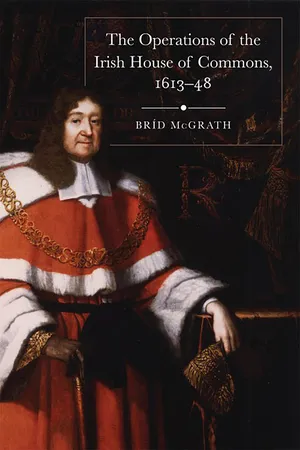
- 613 pages
- English
- PDF
- Available on iOS & Android
The Operations of the Irish House of Commons, 1613–48
About this book
This is the first operational account of the Irish House of Commons in the early Stuart period, a time of immense change in early modern Ireland, when the parliament's structures and operations were established in a manner that would endure until the Act of Union. This book describes the structures, powers, personnel, culture, and operations of the lower house of the Irish parliament, including electoral practice, the legislative process, economics of parliaments, including costs, taxation, and MPs' wages, MPs' individual and collective relationships with government, the House of Lords and their own constituents, the crown, and the English parliament. It also explores how the parliament, its personnel, and work changed during the government of lord deputies Arthur Chichester and Thomas Wentworth and during the period of the Confederation of Kilkenny.
Frequently asked questions
- Essential is ideal for learners and professionals who enjoy exploring a wide range of subjects. Access the Essential Library with 800,000+ trusted titles and best-sellers across business, personal growth, and the humanities. Includes unlimited reading time and Standard Read Aloud voice.
- Complete: Perfect for advanced learners and researchers needing full, unrestricted access. Unlock 1.4M+ books across hundreds of subjects, including academic and specialized titles. The Complete Plan also includes advanced features like Premium Read Aloud and Research Assistant.
Please note we cannot support devices running on iOS 13 and Android 7 or earlier. Learn more about using the app.
Information
Table of contents
- Cover
- Copyright page
- Dedication
- Contents
- Illustrations
- Tables
- Abbreviations
- Acknowledgments
- Introduction
- 1. State, community and parliament: the development of the Irish parliament under the Tudors
- 2. Records of parliament
- 3. Attitudes to representation and parliament: government, MPs and their communities
- 4. Attitudes to representation and parliament: government, MPs and their communities
- 5. Summoning parliament, composition, electoral practice and strategy, adjournments, prorogations anddissolutions
- 6. Culture, ceremony and the social aspects of parliament
- 7. How parliament functioned
- 8. Economics of parliament
- 9. The personnel of the Commons
- 10. Lawyers in and around parliament
- 11. Parliaments and crises
- Conclusion
- APPENDIX ONE
- APPENDIX TWO
- APPENDIX THREE
- Bibliography
- Index